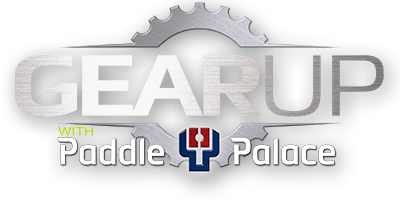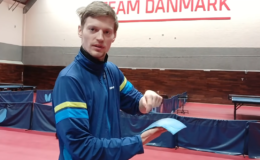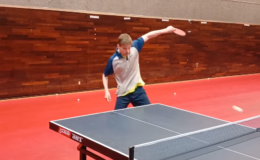By Larry Hodges, USATT Hall of Famer and National Coach
There are fewer things in life nicer than those first few shots with a brand new sheet of rubber right out of the package. This is especially true with a grippy sheet of inverted sponge, with its surface practically grabbing the ball and throwing it back at the opponent with topspin or whatever type of spin you choose.
If you take proper care of the inverted surface, your rubber can do this for a long time. However, many players do not clean their rubber, and so dust and grime collects on the surface, leading to a non-grippy, often inconsistent hitting surface. The ball starts to slide on the surface, and you lose spin and consistency.
You should clean your rubber after each time you play. Some do so with plain water, and that mostly works, but it doesn’t really get off any oils that collect on the surface. That’s why the gods of table tennis created rubber cleaners! Use the rubber cleaner at least somewhat regularly, and wash with water at other times, and the surface will retain its grippiness. I especially use rubber cleaner in tournaments or for important matches at the club, i.e. all of them.
With rubber cleaner, just spray the cleaner on and wipe with a towel. To clean with plain water, wet a corner of your towel and wipe the surface with that, then wipe dry with the rest of the towel.
However, it’s not enough to just clean the surface between playing sessions – it gets dirty during a session as well. If you watch top players, you’ll see a strange thing – many of them will occasionally blow on their racket and then wipe it off with a towel or on their pants or shirt. (Some will wipe it off with the palm of their hand near the bottom, which apparently is a non-oily part of the hand.) The idea is that by breathing on the paddle, you create slight moisture, enough to wipe off the dust and dirt. I do this regularly, usually every five minutes or so, and recommend you do so as well.
It’s especially important to wipe your paddle of regularly if you have a new ball. New balls come with some sort of powder all over them, which leaves a dusty mark on your paddle which takes away the grippiness. With a new ball, I wipe the paddle off (using the breath method) every few points.
If you have a pips-out surface, wiping it with a cloth will help clean the surface of the pips, but it won’t do a complete job, especially since most pips do not have flat surfaces. For pips, you might need to clean it with a toothbrush.
You should keep your racket covered when not in use. Normally you do this with a racket case. You can also keep in a plastic bag, but that practically screams out “amateur!” If you leave the racket out, the surface will deteriorate more rapidly in the air.
If you have a long trip to the club or tournament on a cold day, keep the racket inside the car with you. You don’t want the racket to get cold, which will make it dead until it warms up, which can take a surprisingly long time. I’ve learned this the hard way.
Take good care of your racket, and it will take good care of you!



